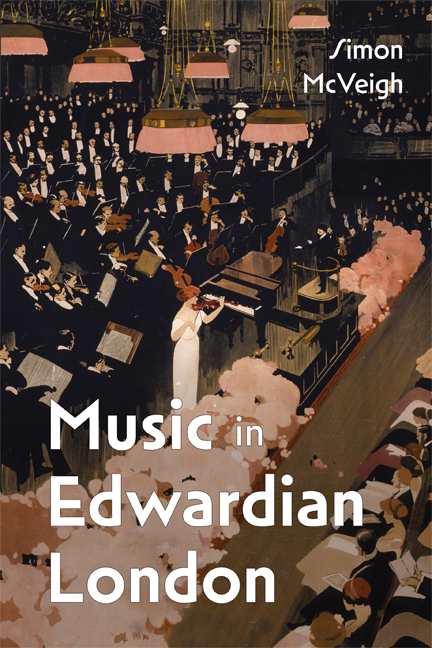Book contents
- Frontmatter
- Dedication
- Contents
- List of Illustrations
- Preface
- 1 Edwardian Soundscapes
- 2 Mapping a Musical City: Place (and Class)
- 3 Mapping a Musical City: Time (and Taste)
- 4 London as Musical Hub: Europe, America, Empire
- 5 The British Question
- 6 Britain and ‘Others’
- 7 Hidden Voices
- 8 From Battersea to Bermondsey: Suburban Music and Local Politics
- 9 London’s Music: An Overview
- Sources and Bibliography
- Index
- Miscellaneous Endmatter
6 - Britain and ‘Others’
Published online by Cambridge University Press: 09 May 2024
- Frontmatter
- Dedication
- Contents
- List of Illustrations
- Preface
- 1 Edwardian Soundscapes
- 2 Mapping a Musical City: Place (and Class)
- 3 Mapping a Musical City: Time (and Taste)
- 4 London as Musical Hub: Europe, America, Empire
- 5 The British Question
- 6 Britain and ‘Others’
- 7 Hidden Voices
- 8 From Battersea to Bermondsey: Suburban Music and Local Politics
- 9 London’s Music: An Overview
- Sources and Bibliography
- Index
- Miscellaneous Endmatter
Summary
THE PREVIOUS CHAPTER BEGAN to raise uncomfortable questions about London's role in the world and about the part played by music in consequence. It's time to face some of these questions head-on.
As the very core of empire, as epitomised by its wealth, its buildings and its symbols of imperial power, Edwardian London appeared unashamedly unapologetic about its colonialist agenda. It is possible that the swagger of British officialdom and the overstated pomp of state occasions were compensating for deep insecurities. Yet still, belief in empire did much to unify the nation, across four countries and every level of society, at a time of great political strain.
The ceremonial aspects of Edwardian music have come to symbolise the whole period. When T.S. Eliot compiled a list of cultural markers, he was obliged to include – alongside the Henley Regatta, the dartboard and Wensleydale cheese – ‘the music of Elgar’. Certainly music's unifying power lay in a common heritage of song and military ceremonial. It's no coincidence that Baden-Powell's method of ‘Hooligan Taming’ (in Scouting for Boys) was ‘to get a large crowd of wild lads together, and to start shouting a chorus to piano accompaniment – say, “Hearts of Oak”’, Boyce's eighteenth-century tribute to naval supremacy and to empire.
Images of a beneficent Britain generously shining the light of civilisation into the stygian corners of the world were everywhere – at theatres, minstrel shows, music halls, popular concerts, and a whole succession of exhibitions and pageants at Earl's Court and Crystal Palace. The patriotic songs of Empire Day, initiated in 1904, were still more explicit. But it was Boer War charity concerts that confirmed Edwardian music's political centrality.
The Albert Hall concert held in January 1900 in aid of the Daily Mail Kipling Poem Fund was only one example.1 Organised by the brass-band enthusiast John Henry Iles, the concert played on every heartstring. All four countries of the union were celebrated in song and chorus, the navy in ‘Hearts of Oak’. The massed bands united in the National Anthem and in ‘Rule, Britannia!’, in a march version of Sullivan's ‘The Absent-Minded Beggar’ (conducted by the composer), and in his ‘Onward, Christian Soldiers’, which was first sung by Clara Butt, before being seconded by the audience.
- Type
- Chapter
- Information
- Music in Edwardian London , pp. 184 - 215Publisher: Boydell & BrewerPrint publication year: 2024



